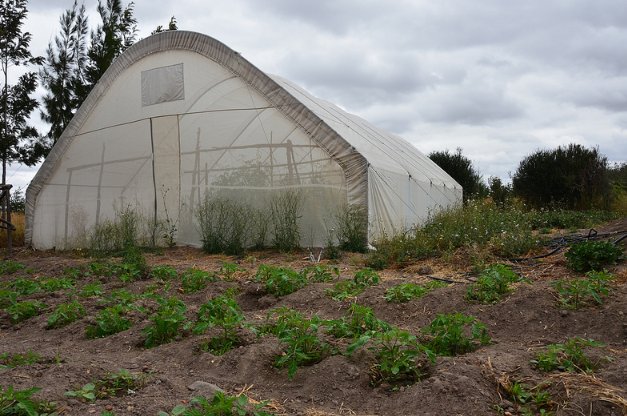 In a tiny village of Kyumbuni along Kithimani market in Eastern Kenya, two greenhouses stands out from swathes of dry barren land. The greenhouses can be confused for a project owned by the locals wealthy businessmen. But behind the greenhouses is the determination and resolve of a 21 year old man who left the city to soil his hands and is now earning more than those he left behind.
In a tiny village of Kyumbuni along Kithimani market in Eastern Kenya, two greenhouses stands out from swathes of dry barren land. The greenhouses can be confused for a project owned by the locals wealthy businessmen. But behind the greenhouses is the determination and resolve of a 21 year old man who left the city to soil his hands and is now earning more than those he left behind.
Brian Mutinda has been named by many visitors to his farm as the face of horticulture farming in arid areas. Fresh produce like vegetables, tomatoes and onions are water guzzlers which explains why farmers in arid and semi arid areas have shied away from them. But Brian believes anything can grow anywhere, and he is proving just that.
“When I finished my secondary education in the year 2009, the first move was to migrate to the capital city just like any other young man would do,” he said. But like an insect jumping from a hot frying pan to the red hot fire, Brian found tougher life awaiting him at the city than he could imagine.
“The main aim why I left for the city was to avoid helping my parents on their farm. Being a young jolly boy, I thought that toiling in the farm was not the best idea," he said. But upon arriving at the city, he joined thousands of other young people in city casual jobs which could pay him not more than Sh150 per day. However, he vividly recalls one day while marketing services and products for one telecommunication firm in the city's Dandora sprawling estates, when he was confronted by armed thugs and robbed of every penny he had gathered on that day.
“That was my last day in the city as a casual labourer," he recalled. He returned home before the end of the first year in the city where he had no choice but to continue helping his father on the farm.
But in the year 2010, while at home, he witnessed his then MP Hon. Charles Kilonzo distributing Amiran Farmers' Kits (AFK) to schools in the constituency, as some of the Constituency Development Fund (CDF) projects. The kit is a 'self contained' tool which includes a greenhouse, a drip irrigation system, a collapsible water tank, a farmer’s knapsack sprayer, gold medal seeds. Fertilizer to cover one season of crop, agrochemicals sufficient for one season, personal protective gear, training and Agro Support..
“I visited three schools including the Matuu Holy Ghost Secondary School, Yanguni Secondary School and Ndalani Secondary School where the kits had been erected and I immediately Knew that this was the way to go especially in the dry land areas which are already being complicated by the ever changing climate conditions,” said Brian.
“When I made up my mind, I approached my father and persuaded him to help me try the greenhouse farming method, which sounded very new and complicated to him," he said. But since his father had trust in his son, he took the risk and went for a loan with an objective of purchasing the farmer's kit. "We bought the kit from the Amiran Headquarters in Nairobi. and on 10 September 2010, I went for a one day training at the Amiran offices, under a professional agronomist Duncan Mwaniki as my tutor," recalled Brian.
The lessons learned during the one day training included proper application of chemicals to avoid chances of pests developing resistance, weed management in a greenhouse setting, use of the drip irrigation system, fertilizer application, establishment of seedbeds, harvesting techniques to avoid damages, post harvest management, record keeping among other lessons. He was later awarded a certificate after the full course.
He later planted tomatoes of Corazon variety which were harvested on December 2011. "From then, I started making at least Sh18, 000 per week, which compared to to Sh900 I used to make in the same period of time while in the city as a casual labourer," he said.
From the proceeds, the young adult has been able to purchase a second kit of the same size with an aim of doubling the profits. "This is just the beginning. I will eventually fill the entire eight acre piece of land with greenhouses," he said.
So far, he has used the proceeds supplemented with some support from his father to pay his college fees at the Moi University in Eldoret, where he is studying chemical engineering. He has employed a farm manager to continue manning the farm as he takes his studies.
















Comments powered by CComment